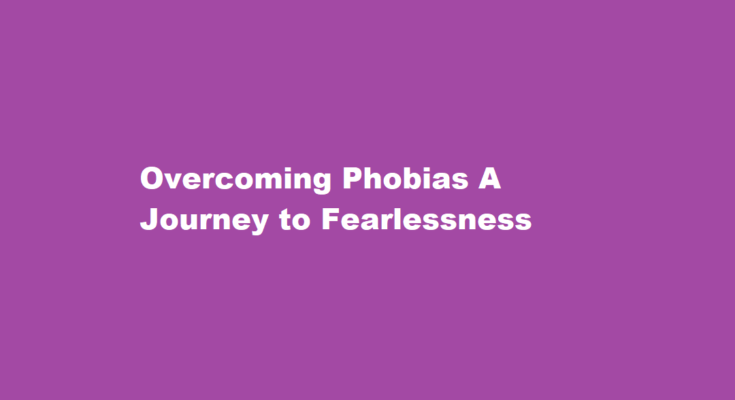Phobias, those intense and irrational fears that grip our minds, have the power to limit our lives and hold us back from fully experiencing the world around us. Whether it’s the fear of heights, spiders, or even social situations, phobias can be debilitating. However, the good news is that they are not insurmountable. With the right mindset and strategies, you can conquer your phobias and regain control over your life.
Understanding Phobias
Phobias are more than just simple fears; they’re intense and often irrational reactions to specific situations or objects. They can be traced back to past experiences, learned behaviors, or even genetic predispositions. Recognizing that your fear is disproportionate to the actual threat is the first step in overcoming it.
Education and Awareness
Knowledge is a powerful tool in overcoming phobias. Educate yourself about the object of your fear. Understanding the science behind it and debunking myths can help demystify the phobia. For instance, if you have a fear of flying, learning about aviation safety statistics and the physics of flight can help calm your nerves.
Gradual Exposure
Exposure therapy is a widely recognized technique for treating phobias. Gradually exposing yourself to the source of your fear in a controlled environment can help desensitize your response. Start small and work your way up. If you’re afraid of dogs, for example, begin by looking at pictures, then videos, and eventually spending time with a calm and friendly dog.
Mindfulness and Relaxation
Practicing mindfulness and relaxation techniques can significantly reduce anxiety related to phobias. Techniques like deep breathing, meditation, and progressive muscle relaxation can help you stay calm when faced with your fear. These techniques also contribute to retraining your brain’s response to the phobic trigger.
Cognitive Behavioral Therapy (CBT)
CBT is a therapeutic approach that focuses on changing negative thought patterns and behaviors. A trained therapist can help you identify the thought processes that contribute to your phobia and guide you in replacing them with more rational and constructive thoughts. CBT equips you with coping mechanisms that empower you to face your phobia head-on.
Support System
Building a support network is crucial. Friends, family, or support groups can provide encouragement and understanding as you work through your phobia. Talking openly about your fears can help lessen their hold over you. Connecting with others who have successfully overcome similar phobias can be particularly inspiring.
Virtual Reality Exposure Therapy
Technology has paved the way for innovative treatments. Virtual reality (VR) exposure therapy allows you to experience simulated scenarios related to your phobia in a controlled and safe environment. This immersive approach can accelerate the desensitization process, making it feel more real than traditional exposure therapy.
Professional Guidance
In severe cases, seeking professional help is crucial. Mental health professionals, such as psychologists and psychiatrists, can tailor a treatment plan to your specific phobia and guide you through the process. They might also explore medications or a combination of therapies if the phobia is significantly impacting your daily life.
Positive Visualization
Harness the power of your imagination for positive change. Visualize yourself confronting your phobia with courage and composure. Repeatedly visualizing success can trick your mind into feeling more comfortable and confident when facing the real situation.
Set Realistic Goals
Setting achievable goals is vital in overcoming phobias. Instead of aiming to eliminate the fear entirely, focus on incremental progress. Celebrate each small victory, as these milestones will gradually accumulate, leading you to greater confidence.
Patience and Perseverance
Overcoming phobias is not an overnight process. It requires patience and perseverance. Understand that setbacks are part of the journey. Be kind to yourself and keep pushing forward, even on challenging days.
Frequently Asked Questions
What are some ways to overcome phobias?
For specific phobias, treatment involves some kind of exposure to the thing you’re most afraid of. Self-exposure therapy, a form of cognitive behavioral therapy (CBT), can be done using self-help books, self-help groups or online self-help resources.
What are the questions about overcoming fears?
is this fear real or imagined? How do you know? What is the downside to not taking action? (What will it be like if things never change?) What is the upside to taking action? (How will it impact your life positively if things change and you get what you want?)
Conclusion
Phobias need not dictate the course of your life. Armed with knowledge, courage, and the right strategies, you can conquer your fears and lead a more fulfilling life. Whether it’s through gradual exposure, therapy, or the support of your loved ones, the path to overcoming phobias is unique for each individual. Remember, you have the power to rewrite your relationship with fear and step into a world where your potential knows no bounds.
Read Also : Switching Your Network A Comprehensive Guide to Porting Your Jio SIM to Airtel



